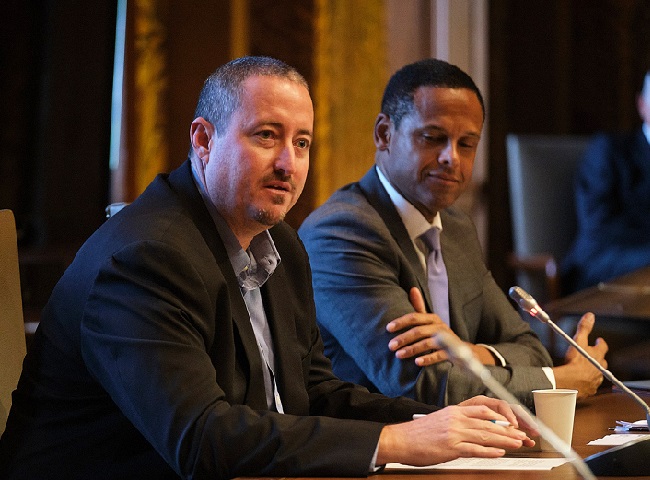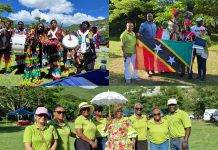THE HAGUE/SABA — Commissioner Bruce Zagers and Island Secretary Tim Muller during their visit to the Netherlands met with Members of the First and Second Chamber of the Dutch Parliament. Issues of importance to Saba including the free allowance, poverty, connectivity, banking and infrastructure were discussed.
Even though the meetings at the various ministries were the focal point of the visit, Zagers and Muller found it important to meet with the First and Second Chamber on Tuesday, July 6. In the morning hours, Zagers and Muller met with several members of the First Chamber’s Permanent Committee for Kingdom Relations KOREL, and in the afternoon, they met with Member of the Second Chamber and a member of the Permanent Committee for Kingdom Relations Jorien Wuite. Present at the meeting in the First Chamber were Senators Paul Rosenmöller (chairman), Jeroen Recourt, Boris Dittrich, Arda Gerkens and Eric van der Burg.
Commissioner Zagers said both meeting went very well. “The Members expressed genuine concern and support for Saba’s issues. They showed understanding and asked many questions. It is important to champion Saba’s cause in Parliament, to share information consistently so we have their attention,” he said. Saba’s Island Council already met with the Second Chamber’s Permanent Committee for Kingdom Relations and a number of individual Members of Parliament (MPs) last month.
Free allowance
The free allowance and the urgent need to raise this yearly amount in order for the Saba Government to be able to cover its operational costs was a major topic in the meetings. Zagers pointed out that while there seemed to be some momentum now to finally increase the free allowance, things seemingly depended on the formation of a new Dutch Government.
Zagers explained that increasing of the free allowance was cardinal since the burden of the local tasks for the Saba Government has significantly increased, also because of incidental project funding which has created structural obligations. “The Public Entity Saba has been forced to neglect or reduce the quality of its services for many of its legal obligations due to these financial constraints. It will not be possible to present a balanced budget for 2022 without having to further sacrifice the quality of services provided.”
Poverty
Another important subject for Saba is the eradication of poverty. The poverty discussion has been ongoing since even before Saba became a Public Entity in 2010. “Some progress has been made but it goes too slow. Implementing a social minimum doesn’t seem to be a goal that is broadly supported in the Netherlands, but it is crucial for the islands. Many people currently live below the poverty line and are forced to work multiple jobs and in some case well after retirement age just to be able to cover rent, basic utilities and food,” said Zagers.
Initiatives that were started during the pandemic, such as subsidies on electricity and internet, will expire at the end of 2021. Zagers said that Saba wanted to have a broad approach where not only a social minimum was established, but that there was also attention for the prices of electricity, telecom, water and transport.
RCN
Zagers was critical of the many unfair discrepancies between the Public Entity Saba and the Caribbean Netherlands Central Government Organization (RCN). According to him, the RCN operates at a “superior level of government” and does not face the same financial constraints as the Public Entity. “This disparity between how the two governments operate is alarming and creates significant attention.”
Zagers gave a number of examples. RCN can afford to send several workers from Bonaire to Saba and Statia to install new furniture whereas the Public Entity Saba can’t afford to buy furniture.
RCN employees are placed on ministry-level scales whereas local government workers are in municipal level scales. “There is a significant difference in not only the value of the scales but also the ranking of positions. RCN workers who work in the Caribbean get paid significantly more than someone who works for the Public Entity in a similar position.”
Winair
The Commissioner noted that the RCN didn’t make use of Winair, the airline in which the Dutch Government owns 8% of the shares, to transport ZVK healthcare clients to and from St. Maarten for medical care. “Winair is struggling especially since the 2017 hurricanes and now with the pandemic. Air connectivity to the islands needs to be greatly improved. Not only is it expensive, but it is limited. The fact that the company is struggling should be known by all ministries.
However, ZVK no longer works with Winair for referrals. It would be far more practical if ZVK made use of Winair. This supports a government owned company while ensuring that connectivity to the islands improves.” Zagers made the suggestion to link any new loan or financially assistance for Winair to a so-called Public Service Obligation (PSO) which would regulate the frequency and the affordability of the vital connectivity with Saba and St. Eustatius.
Harbor
Another subject that was discussed was the construction of the new harbor at Black Rocks and the budget deficit for this largest ever project for Saba. “As the plans for the harbor develop, we are learning more about the facilities needed, but also the costs of such a large project,” said Zagers, who pointed out that it was of utmost importance to “do it right the first time.” In his opinion, cutting costs at this time would deliver a project that is not future proof.
Banking
The banking system on Saba also came up in the meetings. Zagers noted that there was only one bank on the island which he said was not reliable and its services unavailable to persons who have no account at the bank. “There is no access to affordable loan options for individuals or businesses. There is a pilot for loan guarantees on Bonaire, but this is not available for Saba and Statia. This needs to be addressed. Most locals will never have the opportunity to buy or build a home because there are no available or affordable options.” He said that for the business community, the lack of reliable banking services was challenging for their daily operations.































